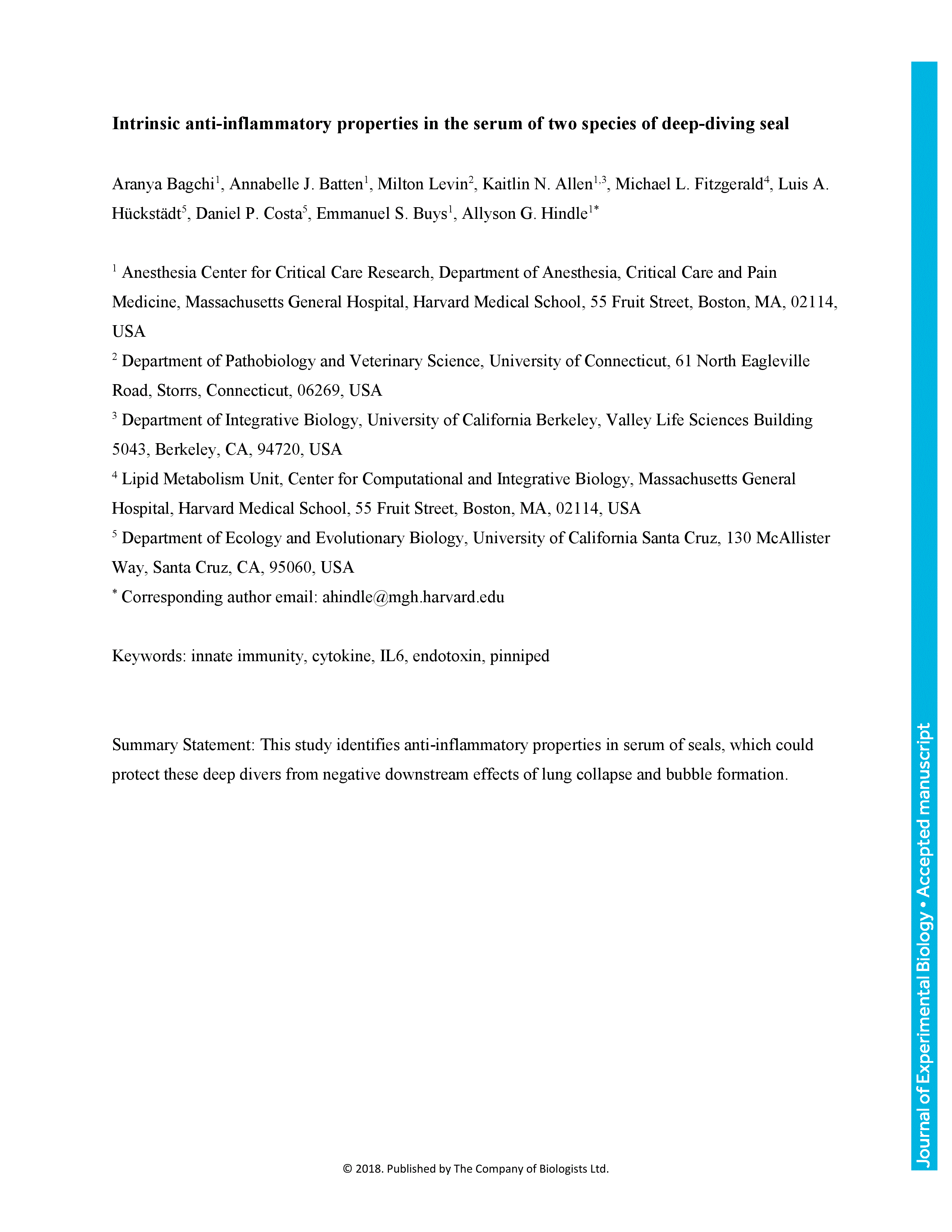Weddell and elephant seals are deep diving mammals, which rely on lung collapse to limit nitrogen absorption and prevent decompression injury. Repeated collapse and re-expansion exposes the lungs to multiple stressors, including ischemia/reperfusion, alveolar shear stress, and inflammation. There is no evidence, however, that diving damages pulmonary function in these species. To investigate potential protective strategies in deep-diving seals, we examined the inflammatory response of seal whole blood exposed to lipopolysaccharide (LPS), a potent endotoxin. IL6 cytokine production elicited by LPS exposure was 50-500× lower in blood of healthy northern elephant seals and Weddell seals compared to that of healthy human blood. In contrast to the ∼6× increased production of IL6 protein from LPS-exposed Weddell seal whole blood, isolated Weddell seal peripheral blood mononuclear cells, under standard cell culture conditions using media supplemented with fetal bovine serum (FBS), produced a robust LPS response (∼300×). Induction of Il6 mRNA expression as well as production of IL6, IL8, IL10, KC-like and TNFα were reduced by substituting FBS with an equivalent amount of autologous seal serum. Weddell seal serum (WSS) also attenuated the inflammatory response of RAW 267.4 mouse macrophage cells exposed to LPS. Cortisol level and the addition of serum lipids did not impact the cytokine response in cultured cells. These data suggest that seal serum possesses anti-inflammatory properties, which may protect deep divers from naturally occurring inflammatory challenges such as dive-induced hypoxia-reoxygenation and lung collapse.
Intrinsic anti-inflammatory properties in the serum of two species of deep-diving seal
Currently Viewing Accepted Manuscript - Newer Version Available
Aranya Bagchi, Annabelle J. Batten, Milton Levin, Kaitlin N. Allen, Michael L. Fitzgerald, Luis A. Hückstädt, Daniel P. Costa, Emmanuel S. Buys, Allyson G. Hindle; Intrinsic anti-inflammatory properties in the serum of two species of deep-diving seal. J Exp Biol 2018; jeb.178491. doi: https://doi.org/10.1242/jeb.178491
Download citation file:
Advertisement
2023 JEB Outstanding Paper Prize shortlist and winner

The JEB Editors are delighted to announce the shortlisted authors for the 2023 JEB Outstanding Paper Prize. Read the winning paper - Tiny spies: mosquito antennae are sensitive sensors for eavesdropping on frog calls - by Hoover Pantoja-Sanchez and Brian Leavell from Ximena Bernal's lab at Purdue University, USA.
JEB Science Communication Workshop for ECRs

If you’re an early-career researcher interested in science communication and are attending the SEB Annual Conference in Prague this summer, come a day early and join the JEB Editors at a sci comm workshop to learn the key writing skills needed to promote your research to a broad audience beyond your peers (1 July at 14.30-17.30). Places are limited to 24 attendees, and applicants should apply through the SEB registration page by 30 April 2024.
Bridging the gap between controlled conditions and natural habitats in understanding behaviour

Novel technologies enable behavioural experiments with non-model species, in naturalistic habitats and with underexplored behaviours. In their Commentary, Scholz and colleagues discuss how to obtain a deeper understanding of the natural ecology and lifestyle of study animals.
Beluga metabolic measures could help save species

To help save animals from extinction, it’s important to understand what each species needs to survive. This led Jason John et al. to measure the metabolic rates of captive belugas to develop a ‘fish calculator’ showing that the whales need to eat ~23 salmon per day.
ECR Workshop on Positive Peer Review

Are you an ECR looking for tips on how to write concise, astute and useful manuscript reviews? If so, join the JEB Editors at a 2-hour JEB-sponsored Workshop on Positive Peer Review at the Canadian Society of Zoologists annual meeting in Moncton on 9 May 2024 at 13.00-15.00. There are 25 spaces for ECRs and selection is first come, first serve. To sign up, check the ECR Workshop box when you register for the CSZ meeting.



